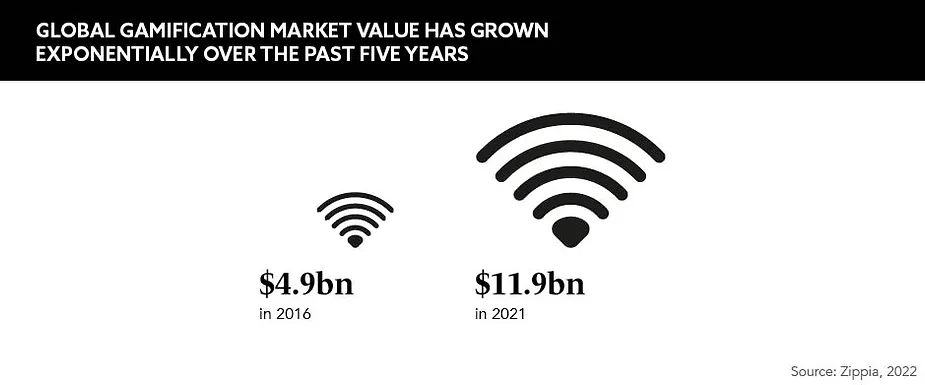Gamification has become a buzzword in the pharmaceutical industry over the last five years, with companies eager to implement new software for both external and internal uses. What must the industry do to successfully implement and integrate gamification?
Words by Jade Williams
The best video game developers know just how to create a game that gets a player hooked, sitting on the edge of their seat aching to beat the next challenge that comes their way. The sense of accomplishment felt when clearing a difficult stage or levelling up is seen by many to be unparalleled, and games such as Pokémon Go! capitalised on this feeling, promoting healthy lifestyles and encouraging users to be active at the same time as getting their gaming fix.
Reminders and rewards
Gamification uses the concepts of extrinsic and intrinsic reward cycles, motivating users to change their behaviours through physical rewards such as points or prizes. Over time, these extrinsic actions can become intrinsic habits. These concepts can be incredibly useful when applied to preventative treatments that rely on behavioural training, such as weight management, nutrition improvement and smoking cessation.
“Gamification can help individuals make better lifestyle choices or improve treatment adherence by reminding, encouraging and awarding patients for completing certain actions such as taking their medication at a specific time each day,” notes Natalie Yeadon, CEO and Co-Founder, Impetus Digital. Introducing an app or similar digital therapeutic to
a patient can enable them to benefit from reminders to take their medication, which could later develop into a habit and eliminate the need for the reward.
Yeadon explains that gamification is incredibly useful for “chronic disease treatments that often lack the instant gratification experienced with treatment for acute diseases – for example painkillers – making gamification well suited for these conditions”. Substituting the physical reward of pain relief for a non-physical reward system acts as a form of instant gratification, motivating the patient to continue with their treatment despite not gaining any immediate, tangible results.

Gamification for education
The rewards of gamification shouldn’t only be seen through the positive impacts on patients, but through use by healthcare professionals, too. Jaume Juan, CEO, Compettia – a platform that enables companies to test their customer’s knowledge through gameplay – believes that gamification could shape the future of education initiatives for HCPs. “Doing a five-day game will increase knowledge about a new product and measure precisely the existing knowledge gaps,” he says. Coupling the launch of a product with an educational game alongside it could be a way to pique the interest of HCPs. As opposed to having them read pages of information, or watch a lengthy video introduction, a game could drive engagement and increase the likelihood of understanding the product’s benefits and prescription.
Coupling the launch of a product with an educational game alongside it could be a way to pique the interest of HCPs
“Another interesting benefit of gamification is that it is digital 99% of the time, which means it is measurable,” explains Juan. “In our case, we can precisely measure knowledge levels per person, topic, subtopic, team and region with such richness due to the vast amount of data generated that was never possible before.” By releasing games alongside new drug launches, companies can keep track of where further educational resources need to be directed, meaning less time and investment will be wasted by promoting educational materials and tools en masse.
Keeping conferences engaging
The pandemic sent congresses and conferences into the virtual space, placing a barrier between pharmaceutical companies and their potential customers. While online and hybrid meetings allowed for these events to continue in some form, they can lack the level of human interaction that in-person conferences establish, which may cause delegates to lose interest in sessions or become easily distracted.
Yeadon goes on to suggest that the use of gamification within these events for greater participant engagement is crucial. “This can be in the form of asynchronous (over-time, anytime) quizzes and challenges, as well as synchronous (real-time) games such as trivia or Jeopardy-style competitions,” she explains. “During web meetings, filters, backgrounds and polls can be used to gamify the session, and virtual scavenger hunts can be organised throughout the event.”
Pharma is experiencing a massive digital transformation
For companies, putting time and resources into conferences and congresses just for attendants to switch off halfway through can be disheartening. As such, event organisers can consider implementing game theory as this can help participants to stay engaged with the content being shared. Engagement in online events could even be incentivised by implementing points systems for events attended or questions asked during a session, benefitting all who are involved.
Getting on board?
A question, however, remains: how can companies implement gamification if they are starting from scratch? Juan sheds some light on the situation, commenting that companies must “start simple with a small first activity using a gamification platform, pilot the project and measure the results”. Introducing a workforce to a new idea can be challenging, but using a pilot project in this way can mitigate the risk of the target audience becoming disengaged by ensuring that there is interest for the software before fully integrating it.
While the pharma industry is far away from immersing patients and HCPs in an open world of role play games, extended use of gamification is certainly on the horizon. The wider sector has already begun putting these practices in place, allowing for more effective adherence systems, education initiatives and events across the board.
“Pharma is experiencing a massive digital transformation like other industries, but it’s also facing a business model transformation regarding how it will interact with HCPs in the very near future,” says Juan. “All these transformations require new processes, skills, training and behaviours. Gamification can help make this happen faster for companies, easier for people and manageable for leaders.” The industry must play to win, and getting into gamification may well set it down a short path to success.










